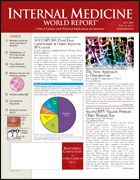Growth Hormone Enhances Lean Body Mass, Not Muscle Mass or Physical Performance
By John Schieszer
TORONTO, Canada—Growth hormone, which is often used by older adults who are hoping to reverse the effects of aging and build muscle mass, does increase lean body mass, but the gain is mostly due to water retention, according to findings presented at the annual meeting of the Endocrine Society. And contrary to popular belief, growth hormone supplementation does not improve physical performance of recreational athletes, except when supplemented with testosterone.
This 8-week study included 97 healthy male and female athletes (aged 18-40 years). The 33 women were randomly assigned to growth hormone or placebo. The 64 men were randomly assigned to growth hormone, testosterone, a combination of these, or placebo. Blood samples were obtained before, during, and 6 weeks after stopping the drugs.
The amount of supplemental growth hormone used was up to 4 times greater than the daily amount that the body produces naturally, which is more than currently used to treat medical conditions related to growth hormone deficiency but is still considered safe for such a short study.
Both before and after hormone administration, fat mass and lean body mass were measured. Extra cellular water was also analyzed, because growth hormone is known to cause fluid retention.
Physical performance was measured before and after hormone administration. The participants bicycled to test for endurance and sprint capacity, performed dead-lift dynamometry (power-lifting) to test body strength, and jumped vertically to test power.
Results showed that in women, growth hormone did not change physical performance compared with placebo. In men, neither growth hormone nor testosterone alone changed any performance level, but the combination of both hormones significantly increased sprint capacity.
"We were surprised to find that human growth hormone has no effect on muscle mass or sports performance; however, when taken with testosterone, it does have an effect," said coinvestigator Ken Ho, MD, head of the Pituitary Research Unit at the Garvan Institute of Medical Research, Sydney, Australia.
Dr Ho said this is "the first large-scale study to evaluate the effects of human growth hormone taken alone and in combination with testosterone in athletes."
Growth hormone has been thought to be a potent performance-enhancing drug since the early 1980s, and many middle-aged and older adults are reportedly buying it over the internet. Dr Ho noted that abuse of growth hormone poses health risks, including diabetes and heart abnormalities.
IMWR
"A lot of young people and elderly folks do take hormone supplementation to boost performance and energy levels, and the bottom line is that we have used high and safe doses of growth hormone and have found it does not have any beneficial effects," Dr Ho told . "There is an enormous number of websites promoting these hormones as antiaging and vitality-boosting substances, and this is a common belief that has pervaded."
He added that primary care physicians may need to consider advising their patients against taking these hormones by telling them that the risks and costs outweigh any potential health benefits.
